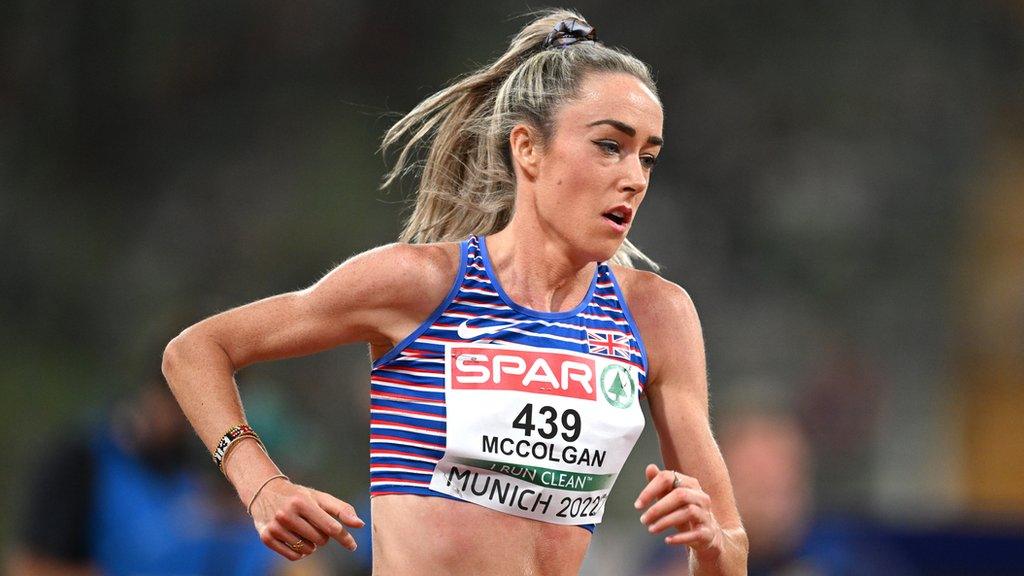World Athletics: Eilish McColgan says more work needed on possible transgender women athlete advantages
- Published

Eilish McColgan won 10,000m gold for Scotland at the Commonwealth Games in 2022
Eilish McColgan, one of Britain's leading long-distance runners, says "a lot more work needs to be done" around the possible advantages of transgender women competing in elite female athletics.
World Athletics has proposed continuing to allow transgender women to compete in female international track and field events.
The governing body has said its "preferred option" was to tighten the sport's eligibility rules, but still use testosterone limits as the basis for inclusion.
McColgan said she "trusts" World Athletics are "doing their due diligence and looking into this properly" after the governing body revealed plans to allow transgender women to continue to compete in track and field under stricter regulations.
"Even if there's a one per cent advantage then it's too much of an advantage," McColgan, the Commonwealth Games 10,000 metres champion, said.
"Rules are in place for other advantageous gains, so this should be one of them.
"[There is a] lot more work to be done to finding out if there is an advantage."
A policy document suggesting the amendments to its transgender inclusion policy has been sent to World Athletics' member federations as part of a consultation process before a vote in March.
Other sports have banned transgender women from participating in elite female competition if they have gone through any part of the process of male puberty amid concerns they have an unfair advantage.
Last week British shot putter Amelia Strickler claimed the revised rules "would leave women at a serious disadvantage" - and said many other athletes felt the same.
McColgan said: "I've had constant abuse online and I already get trolled a huge amount.
"They are my reasons for not being so openly public and coming out on big topics that are discussed all the time."
In June 2022, World Athletics president Lord Coe welcomed the move by Fina - swimming's world governing body - to stop trans athletes from competing in women's elite races if they had gone through any part of the process of male puberty, insisting "fairness is non-negotiable".
Fina's decision followed a report by a taskforce of leading figures from the world of medicine, law and sport which said that going through male puberty meant trans women retained a "relative performance advantage over biological females", even after medication to reduce testosterone.
Fina also aimed to establish an 'open' category at competitions for swimmers whose gender identity is different than their sex recorded at birth.
While such moves have been praised for protecting female sport, some critics have said these rules are discriminatory.
Olympic diving champion Tom Daley said he was "furious" at Fina's approach, saying: "Anyone that's told that they can't compete or can't do something they love just because of who they are, it's not on."
US winger and two-time World Cup winner Megan Rapinoe also criticised, external the exclusion of trans women in some sports.
At the time, Coe hinted his sport could follow suit as he added: "We have always believed that biology trumps gender and we will continue to review our regulations in line with this."
McColgan, speaking on Monday, also suggested an "open category" for athletics.
"I'm more than happy for transgender athletes to be included," McColgan added.
"They need to be included in some way, but the fairest way with regards to women being a protected category of born women.
"I have no lived experience of this or the changes you go through. I can't relate to that and never will.
"It's important we listen to people who understand it because it's definitely a very difficult topic to broach and I don't have the answers.
"Hopefully the people who do make these decisions are doing their job and following the right science."
Last year, British Triathlon became the first British sporting body to establish a new 'open' category in which transgender athletes can compete.
The Rugby Football League and Rugby Football Union also banned transgender women from competing in female-only forms of their games.
It followed World Rugby becoming the first international sports federation to say transgender women cannot compete at the elite and international level of the women's game in 2020.